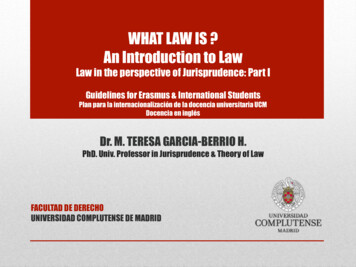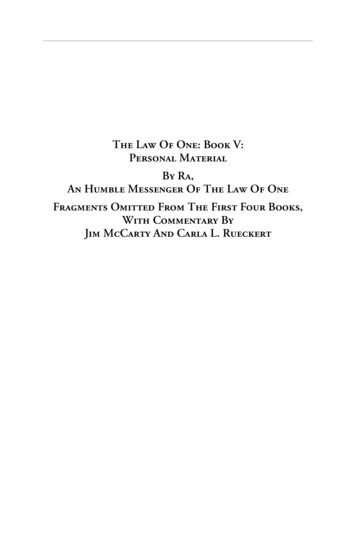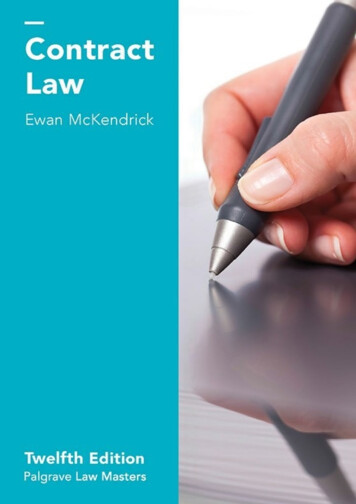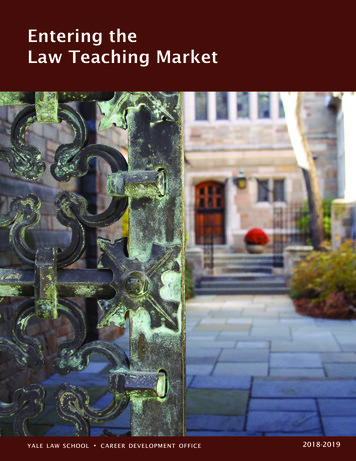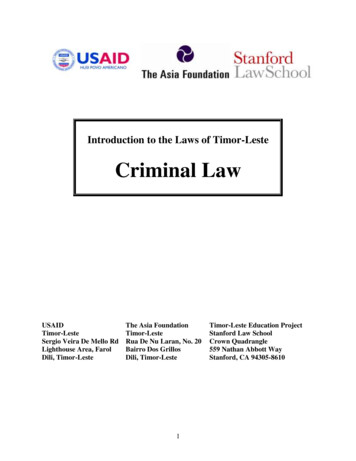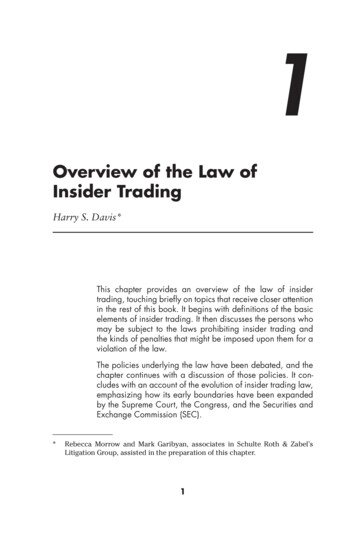
Transcription
1Overview of the Law ofInsider TradingHarry S. Davis*This chapter provides an overview of the law of insidertrading, touching briefly on topics that receive closer attentionin the rest of this book. It begins with definitions of the basicelements of insider trading. It then discusses the persons whomay be subject to the laws prohibiting insider trading andthe kinds of penalties that might be imposed upon them for aviolation of the law.The policies underlying the law have been debated, and thechapter continues with a discussion of those policies. It concludes with an account of the evolution of insider trading law,emphasizing how its early boundaries have been expandedby the Supreme Court, the Congress, and the Securities andExchange Commission (SEC).*Rebecca Morrow and Mark Garibyan, associates in Schulte Roth & Zabel’sLitigation Group, assisted in the preparation of this chapter.1
Insider Trading Law & Compliance AB 2017Q 1.1Definitions 2Scope of Enforcement 4The Policy Debate 11Evolution and Expansion of the Law 16DefinitionsQ 1.1What is insider trading?Insider trading occurs whenever any person or entity (1) tradesin any “security” (2) “on the basis of” (3) material (4) nonpublicinformation (5) which has been obtained in breach of a duty of trustor confidence.1 To be liable for insider trading, a person must also actwith “scienter,” which is fraudulent intent.2Q 1.1.1What is a security?3The term “security” encompasses a wide variety of differentinstruments and interests, including but not limited to common andpreferred stock, treasury stock, notes, bonds, debentures, certificatesof interest, puts, calls, straddles, options, or privileges on any security,and any security-based swap or other derivative instrument.4Q 1.1.2What is trading “on the basis of”?A person trades “on the basis of” material nonpublic informationwith respect to a security if the person was aware of the materialnonpublic information at the time the person purchased or sold thesecurity.5Q 1.1.3What is material information?Information is material if there is a substantial likelihood that a reasonable investor would consider it important in making an investmentdecision.6 Put another way, a given piece of information is material ifa reasonable investor would consider it as having significantly altered2
Overview of the Law of Insider Trading Q 1.1.5the mix of information already publicly available.7 Thus, materialityoften hinges on the significance a reasonable investor would place onthe information.8The courts have not adopted a bright-light test for materiality,nor has the SEC.9 But both case law and SEC pronouncements offernumerous examples of potentially material information, includingearnings information; mergers, acquisitions, tender offers, joint ventures, or changes in assets; significant new products or discoveries, orsignificant developments regarding customers or suppliers; changesin control or in management; change in auditors; significant eventsregarding the issuer’s securities; and bankruptcies or receiverships.10Q 1.1.4What is nonpublic information?Information is considered to be nonpublic if it has not been disseminated broadly to investors in the marketplace.11 Direct evidenceof dissemination is the best indication that information is “public,”for instance, if the information has been made available to the general public through the media or in public disclosure documents filedwith the SEC. In addition, a sufficient period of time must pass for theinformation to permeate through the public channels to be considered public.12 The object is for the information to be available to anddigested by the market such that it is reflected in the market’s pricingof the security.Q 1.1.5Who is an insider?The term “insider” is not expressly defined by the securities lawsor the SEC rules but has been construed by the courts to refer toa person or entity that by virtue of a fiduciary relationship with anissuer of securities has knowledge of, or access to, material nonpublicinformation.13 An insider is one who typically stands in a position oftrust and confidence to the company and its shareholders, such as anofficer, director, controlling shareholder, or employee of a company.3
Insider Trading Law & Compliance AB 2017Q 1.1.6Q 1.1.6Can non-insiders violate insider trading laws?Yes. Outsiders who are tipped off as to material nonpublicinformation and proceed to trade on the basis of (i.e., while aware of)that information are known as “tippees” and may be held liable if thetip was communicated in breach of an insider-tipper’s fiduciary dutyand the tippee knew or should have known of such breach.14 A breachof the insider’s fiduciary duty can be established by proof that theinsider personally benefitted as a consequence of the disclosure.15 Theprecise meaning of “personal benefit”—whether it requires receipt ofa benefit which is objective and consequential or whether a subjectivebenefit will suffice—currently depends upon the jurisdiction in whichthe issue is litigated, and the Supreme Court recently granted certiorarito review seemingly conflicting interpretations by the Second and NinthCircuits.16Q 1.1.7What is the level of scienter required for insidertrading liability? Does recklessness suffice? Howabout negligence?In the civil context, recklessness is the minimum level of scienterrequired to establish an insider trading claim.17 Thus, the SEC or a private plaintiff must prove that the defendant was reckless in not knowing that he or she was trading “on the basis” of material nonpublicinformation in a breach of a duty of trust or confidence. Negligence isnot sufficient to establish an insider trading violation.18 In a criminalprosecution for insider trading, the government must prove that thedefendant acted “willfully”;19 that is, that the defendant committed a“knowingly wrongful act.”20Scope of EnforcementQ 1.2Do the insider trading laws only apply tocorporate officers?No. Although corporate officers owe a fiduciary duty to theirshareholders—to use corporate information only for the benefit ofthe corporation and not for their own personal benefit—the prohibition against insider trading goes far beyond corporate officers. Indeed,any corporate employee, not just an officer or director, owes the same4
Overview of the Law of Insider Trading Q 1.4duty to corporate shareholders to use information entrusted to themby the corporation solely for the corporation’s purposes and not forpersonal benefit (either by engaging in personal trading or from sharing that information with others who then use it to trade—a processknown as “tipping”).21 This duty gives rise to what is known as the“abstain-or-disclose” doctrine, by which a corporate insider is requiredto either abstain from personal trading (or “tipping” others) whileaware of material nonpublic information relating to his or her corporate employer or ensure that that information is fully disclosed anddisseminated to the market as a whole before engaging in personaltrading.22Q 1.3Do the insider trading laws apply beyondcorporate employees?Yes. There are many people and entities that may not be directemployees of the corporation but who still are considered “insiders,”and who therefore have the same duty to disclose the informationthey possess to the market as a whole or abstain from trading (orpassing the information on to others who may trade) while aware ofmaterial nonpublic information.23Thus, auditors, outside accountants, brokers, investment bankers,outside counsel, and the like all owe a similar duty to use informationentrusted to them by their corporate client only for the corporation’sinterests. Such individuals are referred to as “temporary insiders” andthey too are prohibited from trading in their corporate client’s securities while aware of the client’s material nonpublic information.24Q 1.4Do the insider trading laws apply togovernment employees who may come intopossession of material nonpublic informationas a result of their government job?Yes. Government employees are subject to the insider trading lawsin the same manner as any other individual. Government employeesowe a duty of trust and confidence to their employer, the federal government, to abstain from trading on the basis of material nonpublicinformation obtained through the course of their employment. Government employees may be held liable for insider trading under the5
Insider Trading Law & Compliance AB 2017Q 1.4.1misappropriation theory, and also may be prosecuted as tippers if theydisclose inside information to another who then trades on the basis ofsuch information.25 Notwithstanding that there are no exemptions orexceptions for government employees from insider trading laws, therehave been minimal SEC enforcement actions brought against them.Q 1.4.1Are there any specific statutes that regulate insidertrading by government employees?Yes. On April 4, 2012, President Obama signed into law the StopTrading on Congressional Knowledge Act of 2012 (STOCK Act), whichexpressly clarifies and confirms that members of Congress and staffare not exempt from the federal insider trading laws.26 The STOCKAct makes clear that members of Congress and staff owe “a dutyarising from a relationship of trust and confidence to the Congress,the United States Government, and the citizens of the United States”not to misappropriate or misuse material nonpublic information tomake a private profit.27 The STOCK Act is discussed in chapter 13.Q 1.5If I am not employed by or otherwiseaffiliated with the corporation whosesecurities I wish to trade, do the insidertrading laws apply to my trades?Yes. There are two different ways that the prohibition againstinsider trading can apply to a person even if that person has no employment or other connection to the company. First, if the person receivedmaterial nonpublic information from a corporate insider and tradesbased upon that information, the person can be liable as a “tippee.”28Second, even a person with no relationship to the corporate issuercan be liable for insider trading under the “misappropriation theory”for utilizing information obtained in breach of a duty of trust or confidence.29 Determining when such information has been obtained inbreach of a duty of trust or confidence can be a complex matter and,therefore, is treated in more detail in chapter 9.6
Overview of the Law of Insider Trading Q 1.6Q 1.7Could the prohibition against insidertrading apply to me if I do not tradein any securities?Yes, but only in the narrow circumstance where you have learnedmaterial nonpublic information from either a corporate insider orsomeone who has breached a duty of trust or confidence to the sourceof the information and you then share that information with someoneelse who does trade in securities.30 In that circumstance, even thoughyou personally made no trade in the issuer’s securities, you can beliable as a “tipper” for the trading done by the person to whom youpassed the information.31 For that reason, it is important never to passon material nonpublic information to anyone else who may actuallytrade while aware of that information or who may pass it on to otherswho may trade.Q 1.7Who enforces the prohibition againstinsider trading?Several enforcement mechanisms exist to enforce the prohibitionagainst insider trading.First, the SEC brings civil enforcement actions under either section10(b) or section 14(e) of the Securities Exchange Act of 1934 (1934Act) and Rule 10b-5 promulgated thereunder. The SEC has broad regulatory authority to enact new and amend existing rules, and to oversee securities investigations and private regulatory organizations inthe securities fields.Second, the Department of Justice, through the United StatesAttorneys’ Offices, pursues criminal prosecutions pursuant to thesame provisions of the 1934 Act as the SEC by investigating, collectingevidence against, and prosecuting individuals and entities suspectedof insider trading.Third, the 1934 Act establishes a private right of action in favor ofcontemporaneous traders against any person who violates the 1934Act or the SEC rules promulgated thereunder.32 Accordingly, privateindividuals can bring actions for damages against insider traders,“tippees,” and their own corporation (in a shareholder derivativeaction).337
Q 1.8Q 1.8Insider Trading Law & Compliance AB 2017Are the laws prohibiting insider trading inother countries the same as they are in theUnited States?No, the laws of insider trading in other countries are not thesame as they are in the United States. Please refer to chapter 23 fora discussion of the United Kingdom’s and European Union’s insidertrading laws. You should consult foreign counsel if you are trading ona non-U.S. exchange, trading through a non-U.S. broker, trading whilephysically present in a foreign country, or trading in a security of anon-U.S. issuer.Q 1.9If I am trading the securities of a foreignissuer outside the United States, doesthat mean that U.S. insider tradinglaw does not apply?Not necessarily. In Morrison v. National Australia Bank Ltd., theSupreme Court found that the reach of section 10(b) of the 1934 Actdid not extend to private civil litigation regarding “F-cubed” securitiestransactions—that is, transactions involving foreign purchasers,foreign exchanges, and foreign issuers.34 The Court clarified thatsection 10(b) only reaches purchases or sales that are made in theUnited States or that involve a security listed on a domesticexchange.35 Consequently, the so-called “transactional test” governsthe extraterritorial application of section 10(b). The Court was silent,however, regarding insider trading liability in circumstances in whichthe SEC (as distinguished from a private litigant) brought a claim orwhether the U.S. insider trading laws applied where a U.S. persontraded in securities of a foreign issuer or on a foreign exchange wherethe investment decision occurred in the United States. In a later case,United States v. Vilar, the Second Circuit extended Morrison and heldthat criminal liability did not extend to conduct that occurred inconnection with an extraterritorial purchase or sale of securities.36Following Morrison and Villar, courts have further clarified thetransactional test and extraterritorial application of section 10(b): Transactions in securities that are not listed on a domesticexchange may nevertheless be deemed domestic transactions8
Overview of the Law of Insider Trading Q 1.9if “irrevocable liability [to take and pay for a security or todeliver a security] was incurred or title was transferred withinthe United States.”37 For example, placing a buy order in the United States topurchase a foreign issuer’s securities on a foreign exchangeis insufficient to satisfy the “irrevocable liability” analysis,because “irrevocable liability” was incurred where thetransaction was actually consummated (that is, on theforeign exchange).38 By extension of the same logic, aplaintiff’s domestic citizenship or residency, standing alone,is not sufficient to a finding of a domestic transaction.39 Cross-listing of a foreign issuer’s securities on a domesticexchange—dubbed the “listing theory” by some plaintiffs—wasinsufficient to satisfy the requisite nexus of the transactionaltest, where the section 10(b) claim was brought by a foreignplaintiff and the transaction was carried out abroad.40 Again,the focus is maintained on where the transaction was in factconsummated. On the other hand, purchases by foreign plaintiffs of adomestic issuer’s securities through domestic market makersare sufficient to satisfy the transactional test.41 The Second Circuit also extended Morrison’s transactionaltest to private rights of actions brought under the CommodityExchange Act.42After the Supreme Court decided Morrison, Congress enacted theDodd-Frank Act.43 Section 929P(b)(2) of Dodd-Frank states that U.S.courts have jurisdiction under the 1934 Act for violations involving(1) conduct occurring in the United States that constitutes “significantsteps in furtherance of the violation, even if the securities transactionoccurs outside the United States and involves only foreign investors,”or (2) conduct occurring outside the United States that has a “foreseeable substantial effect within the United States.”44 Some courts havetaken the position that section 929P(b) overruled Morrison’s holding,45 while others have left open the question of whether Morrison’s“transactional” approach survived Dodd-Frank.469
Q 1.10Insider Trading Law & Compliance AB 2017Recently, a district court in Illinois held that section 929P(b)(2)does not apply retroactively to any conduct that took place prior toDodd-Frank’s enactment.47 The court held that any extraterritorialtransactions that occurred prior to July 21, 2010, the date when DoddFrank passed into law, will continue to be analyzed via Morrison’stransactional test.Q 1.10What are the penalties for insider trading?Insider trading creates exposure to both criminal and civil liability.The range of criminal penalties depends on the degree of the misconduct and the level of culpability involved. As a threshold matter, aperson may be prosecuted for insider trading only if he or she committed a “knowing or willful” violation of the securities laws. If thealleged wrongdoer is found to have committed such a violation, federal prosecutors may seek a term of imprisonment of up to twentyyears and/or monetary fines of up to 5 million in the case of individuals and 25 million in the case of entities.48 Sentences are imposedpursuant to the Federal Sentencing Guidelines, which establish various factors for the courts to take into account during the sentencingphase, such as the profits made or losses avoided as a result of theinsider trading, whether a position of “special trust” was abused, andwhether the defendant cooperated with the government (as well asthe degree of any such cooperation).49Another ground for criminal remedies is the Mandatory VictimsRestitution Act of 1996 (MVRA), which mandates restitution for securities fraud victims and other victims of fraud or deceit. The primaryobjective of MVRA is to make victims of crimes whole, so courts arenot authorized to consider the defendant’s economic circumstancesin making a restitution order.50In civil suits, remedies available against persons or entities foundliable for insider trading include disgorgement of the profit gainedor loss avoided by the insider trading,51 monetary penalties of upto three times the illicit windfall,52 suspension or bar from being (orbeing associated with) a broker-dealer or investment adviser, injunctive relief to prevent existing and future securities law violations,53freezing assets,54 and punitive damages in certain circumstances.5510
Overview of the Law of Insider Trading Q 1.11Individuals trading contemporaneously with an insider trader alsohave a private right of action against the violator under section 20(A)of the 1934 Act. Section 20(A) allows the recovery of pecuniary damages in the amount suffered by the contemporaneous trader, limitedto the profits gained or losses avoided by the insider trader, less anydisgorgement previously obtained in an SEC enforcement action.56The Policy DebateQ 1.11What are the public policies underlying theprohibition against insider trading?The prohibitions against insider trading prevent fraud, manipulation, and deception in the capital markets. The policies underlyingthese prohibitions emphasize basic principles of fairness, marketintegrity and efficiency, and social justice.57The fairness consideration is intended to protect both outsideinvestors and shareholders of a corporation. An insider is a fiduciaryof the corporation with access to material nonpublic information thatcould significantly affect the corporation. As a result, policymakershave determined that it would be unfair to allow corporate insidersto exploit such information for personal gain, as it is the exclusiveproperty right of the corporation.58 The corporation has investedsubstantial resources into developing the valuable information, anda fiduciary should not be unjustly enriched through the improperuse of such information. Further, it is unfair for corporate insiders tohave an informational advantage over outside investors based uponthe insiders’ access to material corporate secrets.The fairness justification is implicitly based on upholding marketplace integrity. Insider trading laws seek to instill confidence in thesecurities marketplace by ensuring that insiders are not the onlyinvestors profiting from securities trades.59 The concern is that outside investors, especially risk-averse ones, may be deterred fromentering a market where corporate insiders trade on material nonpublic information. Efforts to curb insider trading are intended to increaseinvestor confidence in the securities markets and, in turn, enhancecapital formation.60 The Supreme Court in O’Hagan made clear thatwhile some information disparity between insiders and outsiders is11
Q 1.11.1Insider Trading Law & Compliance AB 2017inevitable, investors will hesitate to invest in a market where insidertrading is unchecked by the law.61 The insider trading laws seek toreduce the risk that insiders will use material nonpublic informationto the detriment of the corporation by preventing insiders from selling the information to outsiders for money, reciprocal information,reputational gains (such as increased clientele or business), or othervaluable benefits. The insider trading laws also seek to eliminate anypossible quid pro quo arrangement where an insider and noninsidertrade valuable market information to the detriment of shareholdersand other outside investors.62Finally, an emphasis on social justice and emotion-based moralarguments also underlie the insider trading laws.63 The securitieslaws and SEC rules seek to keep the “mom and pop” shareholders or“widows and orphans” from being disadvantaged by corporate insiders, who are often portrayed as “insidious people who have littleregard for morality and could care less about their reputation.”64 Socialjustice grounds the insider trading laws as a way to deter insidersfrom stealing from the “little guy.”65Q 1.11.1Is insider trading law intended to ensure thateveryone has the same information?No. Insider trading law is not intended to ensure equality of information among traders; rather, the focus is on providing everyone equalaccess to material information.66 The securities laws are not violatedby a mere asymmetry of information between trading partners. Someindividuals may be at an informational advantage by having accessto nonpublic, albeit nonmaterial, information, while other tradersmay achieve higher returns based on their own superior ability topiece together public information. In either scenario, the law does notimpose an abstain-or-disclose obligation on such individuals despitethe fact that they have more information than other traders in themarket.Instead, insider trading law advocates that all investors tradingin the marketplace have relatively equal access to important information.67 The registration requirements in the Securities Act of 1933(1933 Act) and the disclosure requirements in the 1934 Act and theSarbanes-Oxley Act of 2002 (SOX) facilitate the goal of providing12
Overview of the Law of Insider Trading Q 1.11.1everyone with equal access to relevant information regarding securities. Accordingly, there is an expectation that insiders will communicate functional information to others in the marketplace.68 The Second Circuit in Texas Gulf Sulphur noted that “inequities based uponunequal access to knowledge should not be shrugged off as inevitablein our way of life, or, in view of the congressional concern in the area,remain uncorrected.”69Nonetheless, in spite of the longstanding doctrine that “insidertrading liability is based on breaches of fiduciary duty, not on informational asymmetries,”70 recent congressional efforts in the wake ofUnited States v. Newman—a Second Circuit decision that is discussedlater in this and subsequent chapters and which clarified the application of insider trading liability (at least in the Second Circuit)—maypotentially attach liability to mere informational asymmetries.For example, the Stop Illegal Insider Trading Act, introduced inthe Senate on March 11, 2015, would make it unlawful, inter alia, totrade securities “on the basis of material information that the personknows or has reason to know is not publicly available.”71 Though thisbill specifically excludes information that was developed “independently from publicly available sources” and permits the Securities andExchange Commission to exempt any persons, transactions, or communications as “necessary or appropriate in the public interest andconsistent with the protection of investors,” its broad prohibition isnot anchored to trading on improperly obtained information; rather,the bill would apply equally to all trading on the basis of material,nonpublic information.72 This proposed legislation would penalize theproverbial subway passenger who mistakenly picks up a corporateinsider’s briefcase—believing it to be his—and proceeds to trade onthe information found inside.This broad approach has found favor with those legal commentatorswho are advancing an “equality of access” insider trading theory. Likethe proposed legislation, the “equality of access” theory would prohibittrading on the basis of non-publicly available information irrespectiveof breaches of fiduciary duty or misappropriation of confidential information.73 Other commentators have taken a middle-ground approach,advocating against a showing of “any kind of benefit to the insiderbefore the tippee is subject to criminal prosecution,” but arguing that13
Q 1.12Insider Trading Law & Compliance AB 2017Rule 10b-5 should “cover only those activities actionable under common-law theories dealing with misrepresentation, nondisclosure, andbreach of fiduciary duty.”74Q 1.12Are there critics of the prohibition againstinsider trading?Insider trading is a frequently discussed area of securities law thatinvites not only proponents but also opponents of the prohibitions.The policies underpinning insider trading law are not universallyaccepted.One well-regarded commentator seeks to refute the market integrity justification by arguing that the SEC rules do not level the playingfield for all investors,75 that there will never be a level playing fieldbecause market professionals will always tilt the information in theirfavor,76 and that outsiders are not disadvantaged by insider tradingbecause the stock price absorbs the risk.77Other critics claim that insider trading is not contrary to notionsof fairness, because insider trading allows both insiders and outsidersalike to profit.78 In addition, one critic acknowledged the fact that thesecurities markets in countries that do not prohibit insider tradingreceive far higher liquidity and price-to-earnings ratios than corporate stock traded on the New York Stock Exchange.79 Thus, ProfessorJonathan Macey has pointed to the Japanese capital market as showing no signs that investors have low confidence in the securities market even though insider trading is commonplace and accepted.80Q 1.12.1What are the arguments against prohibitinginsider trading?One of the main arguments against prohibiting insider trading isthat there is no evidence insider trading causes any serious harm.Scholars posit that if insiders were allowed to use confidential corporate information, the marketplace would benefit. It is argued thatif firm managers were permitted to trade on material nonpublic information, the corporation’s wealth would grow and consequently itsstock value would increase to the benefit of all investors.81 Moreover,trading on inside information arguably enhances marketplace efficiency14
Overview of the Law of Insider Trading Q 1.13because it increases the accuracy of the prices of securities andreduces price fluctuations that may lead to windfall gains.82Another argument against prohibiting insider trading is that insidertrading is a valuable form of managerial compensation. If managerswere allowed to base part of their compensation on insider trading,there would be greater development of valuable information, investment in human capital, and more profitable yet riskier investmentprojects for the corporation.83Deregulators also contend that public regulation of insider tradingis unnecessary and it should be permissible for corporations to privatelycontrol insider trading by contracting property rights in valuableinformation.84 In other words, if insider trading is efficient for the firm,then shareholders would allow it, and the government should acquiesce in that decision.85 Alongside this argument, it has been proposedthat the law should be structured to give people the incentive to usetheir resources efficiently. Insider trading laws do just the opposite,according to critics: By prohibiting insiders from capitalizing on internal information, such laws discourage innovation.86 According to onescholar, firms will bear the costs associated with creating informationand share it with the marketplace, but only if they are able to exploitits benefits as well.87 Mandatory disclosure of information reduces thevalue of the information and thus the motivation to produce it. On thisview, insider trading can and should be controlled by private enforcement mechanisms available between contracting parties.Q 1.13How does insider trading negatively affectthe marketplace?One of the principal arguments against insider tradi
to either abstain from personal trading (or "tipping" others) while aware of material nonpublic information relating to his or her corpo-rate employer or ensure that that information is fully disclosed and disseminated to the market as a whole before engaging in personal trading.22 Q 1.3 Do the insider trading laws apply beyond






